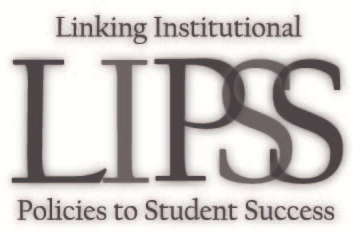Quick Summary of Project...
Generous support for the LIPSS project provided by the TG Public Benefits Grant Program and the Center for Higher Education Research, Teaching, and Innovation.
The Linking Institutional Policies to Student Success (LIPSS-Pilot) seeks to identify specific institution-wide policies that might be leveraged to increase college student engagement – a key predictor of student grades and persistence that is especially beneficial to Hispanic, African American, and academically under-prepared students (Kuh et al., 2008).
Although college graduation statistics are typically computed after four or six years of college attendance, the largest threat to eventual student graduation happens in the first year of college. Roughly 27% of students who start at a bachelor’s-granting college or university do not return for their second year (ACT Inc., 2010). Campus initiatives designed to combat first-year attrition, however, are often costly and typically serve only a small group of students who participate directly in a given program (e.g., a first-year seminar or living-learning community). As a result, college and university leaders seek specific, resource-efficient ways to increase student engagement, persistence, and graduation across an entire campus. However, most studies of institution-level differences, what Pascarella and Terenzini (1991, 2005) call “between-college effects,” speak broadly of organizational “environments” and “cultures” (for a review see Berger & Milem, 2000), concepts that are too abstract to provide academic administrators with practical guidance regarding specific institution-level policies that lead to improved student outcomes.
The LIPSS project builds upon findings from a previous study, called Parsing the First Year of College. Results from this previous project indicate that institutional policies have relatively little influence on faculty perceptions or teaching practices (Cox et. al, in press). Other analyses, however, suggest that such policies may create a campus ethos that facilitates first-year student success (see press coverage of a related presentation here).
Although findings from the previous study hint at the potential roles played by institutional policies, the relatively small sample size (33 institutions, 5,906 students) in the earlier project caused two substantial limitations that will be overcome with the LIPSS project. First, with only 33 participating institutions, we lacked the statistical power to detect the unique contributions of specific types of institutional policies. Second, because the previous student sample was relatively small and homogenous, we were unable to isolate race-specific effects of institutional policies.
The LIPSS project is designed to allow analyses that test the links between specific policies and specific experiences for specific populations of students. Findings from the study will have the potential to shape college and university policies that will, in turn, contribute to student success and close gaps in student outcomes.



